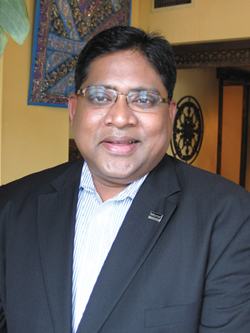By Jason Cruz
NORTHWEST ASIAN WEEKLY
After years of lobbying and waiting, Seattle will be home to its own Indian Consulate to serve the needs of the region.
The announcement that Seattle would receive an Indian Consulate was first announced in 2016. The long wait is attributed to the demand for help in the U.S.
“The reason being is that there are so many of them,” explained Debadutta Dash, co-chair of the Washington State and India Trade Relations Action Committee. He added, “The second reason is that it is reciprocal in nature. There are so many cities in the U.S. with an Indian diaspora. Seattle is one of them, but there are so many of them.” For a consulate to open in a city, there must be an opening in India, according to Dash.
Prakash Gupta, who served in Indonesia, New York, and China, has been appointed to lead the Seattle Consulate. A reception was held on his behalf at the Seattle University’s RoundGlass India Center last month.
“We have been anticipating a consulate since 2009,” Dash added. “In 2010, we lost out to Atlanta.” Dash recalls that the Indian Ambassador came to Bellevue to visit and many had hopes that it was a sign of a consulate. Nevertheless, the Pacific Northwest had to wait.
The business community advocated for an Indian Consulate, which would facilitate commerce between the region and India. The purpose of the consulate is to help the region work with the Indian government. Trade is one of the central issues with the consulate. Dash noted that Washington agricultural business would be given a helping boost with the consulate. He stated that wine and fruit, especially Washington apples, are in huge demand.
Consul General Gupta stated that the Seattle Consulate will “open doors to the Indian regulatory environment for U.S. tech businesses, provide consular support to the large Indian population in the region and partner with educational institutions such as Seattle University to promote Indian literature, arts, and cross-cultural connections with Indian educational institutions. Seattle University’s RoundGlass India Center serves as a partner as a bridge between intellectual and practical ideas and its implementation in industry.
The Seattle Consulate’s jurisdiction will cover Washington, Idaho, Montana, Oregon, Alaska, Nebraska, Wyoming, North Dakota, and South Dakota, making it geographically one of the largest areas covered by any Indian Consulate in the country.
In addition to working with trade in India, the consulate will facilitate visa and passport needs. Dash noted that companies had to work with the Indian Consulate in San Francisco, the closest to Seattle, to obtain assistance. The hope is that the continued growth would possibly mean easier travel connections to India from Washington state.
Dash also noted that the growing population of Indians and Asians in commerce, the tech sector in the region, and the proximity to the Bay of Bengal make Seattle an attractive place for the consulate.
“The Indian community is rapidly growing here in Seattle and across our state, as individuals and families from the Indian diaspora make our region their home, bringing immeasurable contributions to our communities economically, culturally, and socially,” said Mayor Bruce Harrell. “As the 10th permanent foreign mission in Washington, this marks an important advancement in our region’s growing bond between the Pacific Northwest and India.”
Indian citizens make up the second largest foreign-born population after Mexicans in Washington state. Some of the cities throughout the state are more than 20% Indian, including Bothell East, Mill Creek East, and Redmond. The greater Seattle area is home of the sixth largest Indian population in the U.S.
Jason can be reached at info@nwasianweekly.com.




